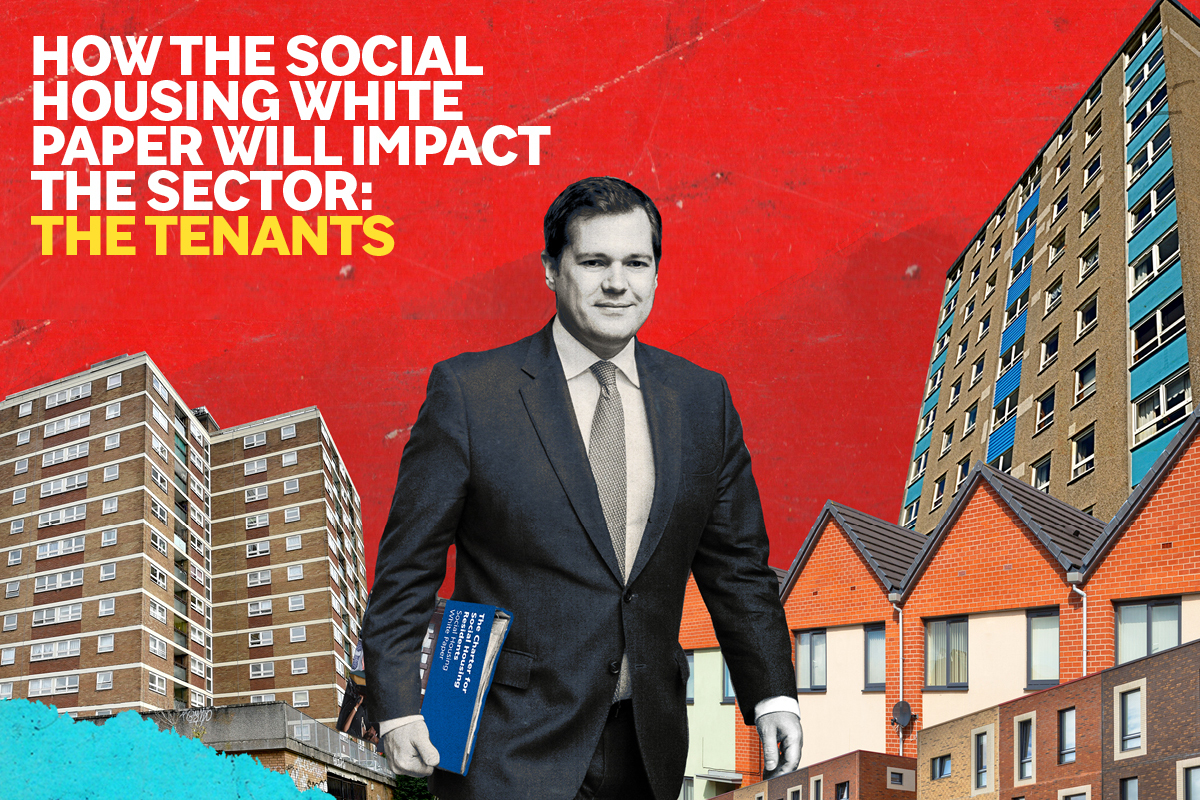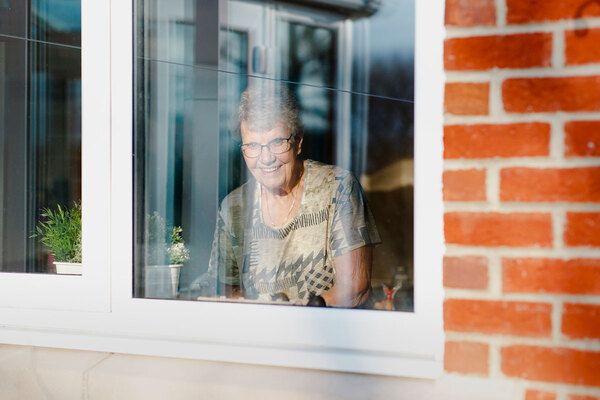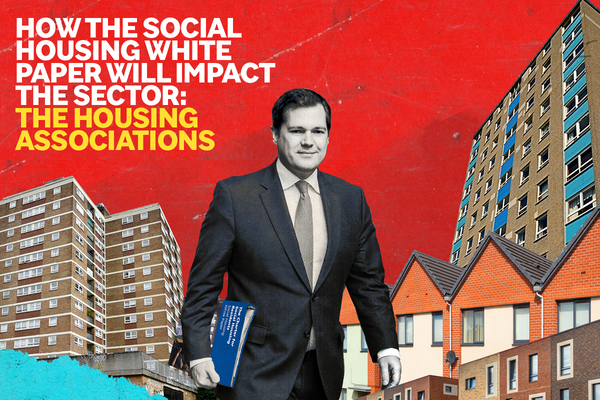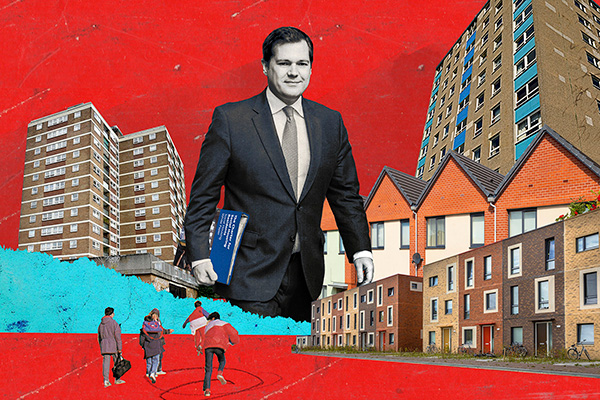You are viewing 1 of your 1 free articles
How the Social Housing White Paper will impact the sector: the tenants
Following the release of the Social Housing White Paper last week, Lucie Heath explores how the government’s proposals will impact tenants
In his foreword to the Social Housing White Paper, prime minister Boris Johnson said the proposals put forward in the document would above all “give social housing tenants a voice and ensure that it is listened to”.
This has been the purported goal of the white paper since it was first announced more than three years ago in the wake of the Grenfell Tower tragedy, which exposed the various ways in which social housing tenants could be ignored and disrespected.
Here, Inside Housing looks at some of the key proposals being put forward in the document and speaks to campaigners and tenant organisations to ask how they will impact the lives of those living in social housing.
Consumer regulation
At the heart of the Social Housing White Paper is the plan to give increased powers to the Regulator of Social Housing (RSH). Under the current regulatory regime, landlords are mainly assessed on their financial viability and governance arrangements, with the white paper admitting that regulation around consumer standards “is not strong enough”.
The white paper broadly aims to move back towards a more proactive approach to consumer regulation that existed in the sector before the government scrapped the Tenant Services Authority in 2010. One of the main ways it intends to do this is by introducing routine inspections of landlords with more than 1,000 homes. The government has also proposed getting rid of the ‘serious detriment’ test, which prevents the regulator from intervening in consumer issues unless it believes tenants are at risk of severe harm.
Leslie Channon, a campaigner for tenants who helped set up a series of ministerial roadshows to inform the Social Housing Green Paper, says the proposals around the regulation are “exciting”.
In reference to the regulatory regime for schools, she says: “It’s kind of like if you have Ofsted coming and you know that if Ofsted is coming in year four, you’re going to do what you need to do.”
Social housing activist Rob Gershon is also happy to see the regulator be given more powers concerning consumer regulation, but cautions that we will need to wait until the Spending Review “to make sure that this isn’t just words”.
The white paper fell short of introducing a new regulator, as proposed by Grenfell United and the homelessness Shelter. In its response to the white paper, Grenfell United said: “We’ve got the same Social Housing Regulator but for the first time this regulator will be tasked with rooting out toxic landlords through proactive inspections.”
“The responsibility now lies with the regulator and ombudsman to use their new powers to ensure no residents are ever treated how we were,” the response added.
Transparency
The white paper proposes that the regulator will also play an increased role in ensuring the transparency and accountability of social landlords toward those living in their homes. As part of this, the government will ask it to develop a process for collecting and publishing a core set of tenant satisfaction measures for all social landlords.
A new ‘access to information’ scheme, similar to Freedom of Information Act requests, is also being proposed, while the regulator will be tasked with ensuring that social landlords provide a clear breakdown of how they are spending their income.
Again tenant groups are largely positive on these changes. However Ms Channon warns that the effectiveness of the plans “depends on what they’re going to measure”, adding that simply measuring customer satisfaction “is not going to work”.
Jenny Osbourne, chief executive at tenant engagement organisation Tpas, adds: “I think we remain cautious around the set of measures. We don’t want to see KPIs… that are meaningless – that distracts us from what we think is one of the most important things, which is culture.”
Pat Turnbull, regional representative at London Tenants Federation, says the “extension of some version of Freedom of Information to tenants of housing associations” is an idea that “appears to hold promise”.
Complaints
The white paper also intends to make it easier for social housing tenants to submit complaints to the Housing Ombudsman. Changes have already been put in motion within the Housing Ombudsman, which introduced a new Complaint Handling Code earlier this year. Landlords will have to self-report against this code by the end of December.
The white paper also proposes getting rid of what Ms Channon refers to as the “stupid ‘designated person’ rule”, which forces tenants to submit complaints to the ombudsman through an MP, councillor or designated tenant panel.
The government has said it will also run an awareness campaign to ensure tenants know how to complain about their landlord and has already agreed to increase the organisation’s resources in an attempt to speed up the complaint process.
Tenant engagement
Several proposals have been put forward to improve how landlords engage with tenants and listen to what they have to say. This includes a commitment from the government to work with national tenant-led bodies to deliver an “empowerment programme” to give tenants the tools to better influence landlords and hold them to account.
Ms Osbourne says she is “really pleased to see the stuff around the empowerment programme”, but is glad this is backed up with regulatory support as “tenants can’t do all of this on their own”.
Darren Hartley, chief executive of Taroe Trust, believes the proposals will lead “to improved accountability to tenants and to the ability for tenants voices to be heard” within “landlords’ individual organisations”. However, he is disappointed that the white paper has dropped the idea for an independent national platform for tenants, which he said would enable tenants to better influence policymaking nationally.
Ms Turnball labels the empowerment programme proposals “top down” and “old hat” and says it is “deeply insulting” to tenants’ groups that there was no mention of the role of tenants’ and residents’ associations in giving a voice to tenants.
Safety and standards
The final parts of the white paper that will have a big impact on tenants lives are the two separate sections on building safety and quality.
Many of the proposals around building safety, such as the introduction of a new Building Safety Regulator, were part of the Building Safety Bill.
Under the white paper proposals, landlords will also be required to appoint a ‘responsible person’ who will ensure the organisation is complying with consumer standards and who should be widely accessible to tenants. Ms Osbourne says having a named person gives tenants “clarity” about whom to hold to account.
In terms of housing quality, the government has confirmed that it will review the Decent Homes Standard, which sets the minimum quality that social homes should meet. Ms Osbourne labels this “a real step forward”.













